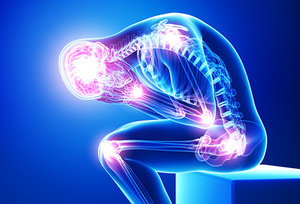When Chronic Pain Turns Deadly
By Editorial Staff
If you're suffering from chronic pain, for example, chronic back pain, here are the far-too-common options many people still pursue: live with the pain, no matter how agonizing; continue to take pain medication, which may abate the symptoms temporarily, but won't address the cause; or undergo risky surgery, which in many cases doesn't eliminate the pain, either.
Why choose a better option – say, chiropractic – for chronic pain? It's not just because chiropractic has been shown to be safe and effective for many types of acute and chronic pain, although that's a great reason. And it's not because according to the Centers for Disease Control and Prevention,
millions upon millions of people suffer chronic pain; although again, that shocking statistic points to the need for more effective options. No, the most important reason relates to a potential consequence of chronic pain that is only now getting the attention it deserves:
suicide.
According to recent research, nearly one in 10 suicide deaths in the U.S. is attributable to chronic pain, and the numbers – both of chronic pain sufferers and people who take their lives due to chronic pain – are rising. In fact, the proportion of suicides due to chronic pain rose from 7.4 percent of all suicides in 2003 to 10.2 percent in 2014, underscoring both the increasing burden of chronic pain and the increasingly fatal consequences.
 With nearly one in six suicides in chronic pain sufferers determined to be due to opioid overdose, and chronic pain sufferers who ultimately took their lives three times as likely to have tested positive for opioids when they died compared to people who did not commit suicide, it's clear nondrug options for managing / eliminating chronic pain should be a health care priority. Combined with the fact that back pain and arthritis pain were among the most common chronic pain conditions, according to the study, it's clear chiropractic should take priority when dealing with pain, whether acute or chronic.
With nearly one in six suicides in chronic pain sufferers determined to be due to opioid overdose, and chronic pain sufferers who ultimately took their lives three times as likely to have tested positive for opioids when they died compared to people who did not commit suicide, it's clear nondrug options for managing / eliminating chronic pain should be a health care priority. Combined with the fact that back pain and arthritis pain were among the most common chronic pain conditions, according to the study, it's clear chiropractic should take priority when dealing with pain, whether acute or chronic.
Fortunately, in the wake of the opioid epidemic, health care organizations, policy-makers and insurers are starting to listen. Talk to your doctor to learn more about how to address pain without medication.

